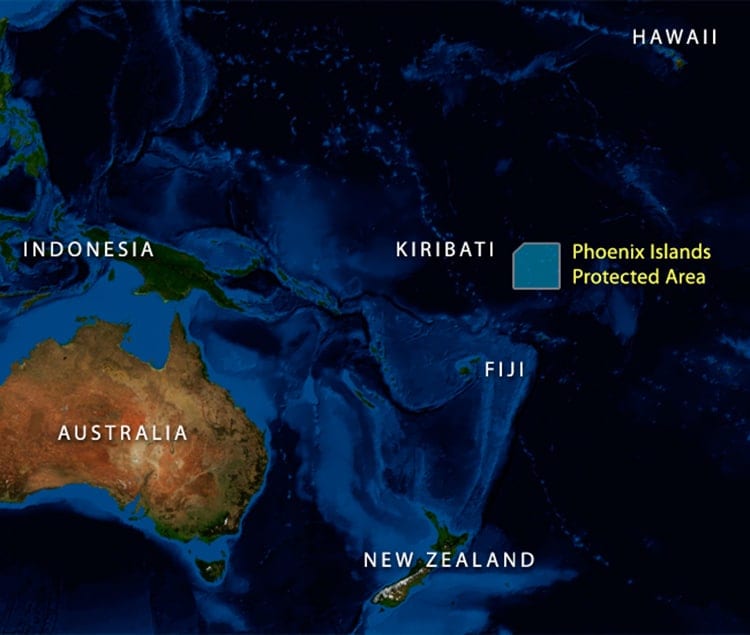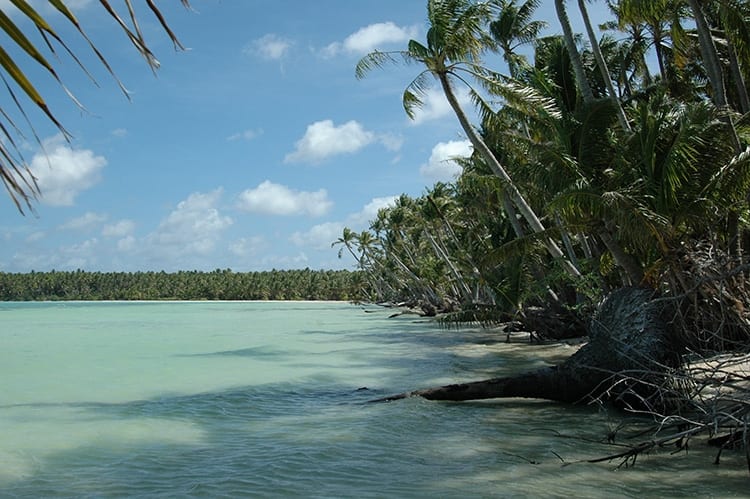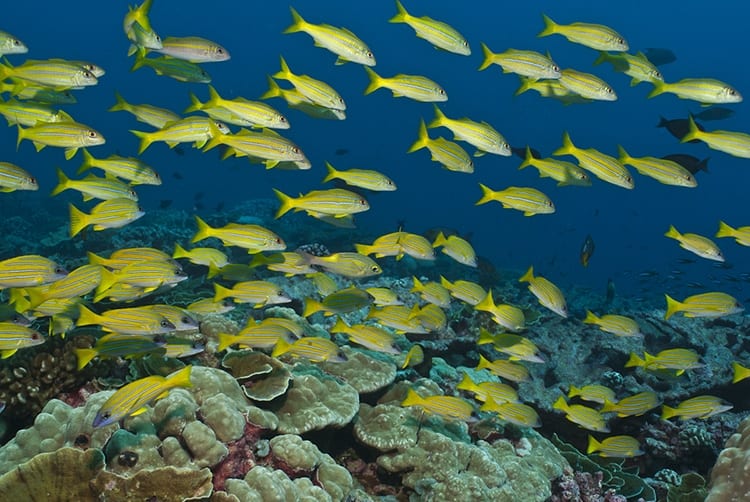WHOI, NEAQ Embark on Expedition to the Phoenix Islands
August 31, 2015
A research team led by the New England Aquarium (NEAQ) and Woods Hole Oceanographic Institution (WHOI) are heading out on a 6,000-mile expedition to one of the most remote places on Earth—the Phoenix Islands in the central Pacific Ocean. Throughout the month of September and in the midst of a strengthening Pacific El Nino, researchers will investigate the combined effects of climate change and human activity on the these vast coral reef ecosystems and the diversity of life they sustain.
Directed by biologists Randi Rotjan of NEAQ and Simon Thorrold of WHOI, the team will study how the El Nino is affecting the conditions of the reefs as well as the health and viability of the reef-building corals, how the region’s once plentiful shark population is recovering from shark finning activity, and how disintegrating shipwrecks are affecting marine life in the Phoenix Islands Protected Area (PIPA).
The team, which will be working from the German research vessel, The Hanse Explorer, will also study the abundant aquatic life from fish to crustaceans to mollusks to sea turtles. Camrin Braun, a MIT/WHOI Joint Program student in Thorrold’s lab, will be onboard to investigate the structure of food webs on the reefs and the movements of reef sharks and manta rays. Hanny Rivera, a MIT/WHOI Joint Program student in co-PI Anne Cohen’s lab at WHOI, will also be onboard using an array of new sensors to characterize reef conditions, including levels of acidification, evaluating corals for signs of stress as temperatures exceed 2°C above normal, and collecting tissue samples that will allow her to examine genetic connectivity (relatedness) of corals both among the different PIPA islands and across the greater Pacific.
“PIPA is a remarkable natural laboratory where we are studying coral reef resistance and resilience, local human impacts and global climate change,” Thorrold said. “This knowledge is essential to maximize our efforts to identify and protect coral ‘refuges’ within the broader Pacific Ocean that represent the most likely way that we can ensure the survival of coral reef ecosystems into the next century and beyond.”
In 2002, the coral reefs around the Phoenix Islands, owned by the Republic of Kiribati and located between Hawaii and New Zealand, suffered a devastating bleaching event when ocean waters warmed over 21 Degree Heating Weeks (DHW) and much of the reef was damaged. The reefs are showing signs of recovery, but with El Nino strengthening in the Pacific and temperatures in the PIPA expected to match or even exceed those of 2002, a new level of urgency surrounds this expedition as the team searches for signs of new bleaching.
During the expedition, Cohen’s team which includes Rivera, Elizabeth Drenkard a MIT-WHOI Joint Program graduate, and Chip Young from NOAA’s Coral Reef Ecosystem Division, will deploy a suite of sensors to accurately measure temperature, pH, light, oxygen, flow and nutrients in different parts of each reef. Such measurements are critical to understanding ecosystem resilience because conditions on the reef are not the same as in the open ocean. Members of the Cohen lab were last at PIPA in 2012, during neutral El Nino conditions. They expect the reefs to be very different this time around.
The Kiribati government created the Phoenix Islands Protected Area in 2008. As of Jan. 1, 2015, almost all the marine protected area became no-take, meaning that no fishing can occur in this ocean area that is roughly equivalent to the size of all of New England.
The 16-member team also includes representatives of the Kiribati government and scientists from Scripps Institution of Oceanography, NOAA, Rutgers University, and King Abdullah University of Science and Technology in Saudi Arabia.
Sangeeta Mangubhai, of NEAQ and the Wildlife Conservation Society, will be the chief scientist onboard. Rotjan, Thorrold and Cohen will direct their teams from their home organizations in Boston and Cape Cod by satellite phone and are available for interviews throughout the trip. WHOI researchers onboard will be posting updates on their expedition blog throughout the month-long expedition.
Funding for the WHOI research on this project was provided by the Robertson Foundation.
The Woods Hole Oceanographic Institution is a private, non-profit organization on Cape Cod, Mass., dedicated to marine research, engineering, and higher education. Established in 1930 on a recommendation from the National Academy of Sciences, its primary mission is to understand the ocean and its interaction with the Earth as a whole, and to communicate a basic understanding of the ocean’s role in the changing global environment. For more information, please visit www.whoi.edu.
####
Additional Media Contacts:
Tony LaCasse, Media Relations Director, New England Aquarium, 617-877-6871; tlacasse@neaq.org
Diana Brown McCloy, Media Relations Team, 978-697-9414; Diana@teakmedia.com



